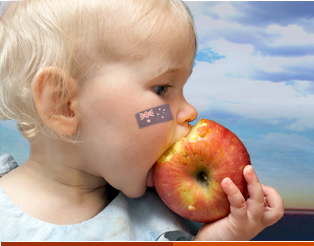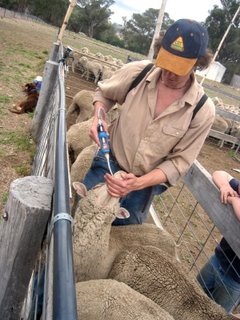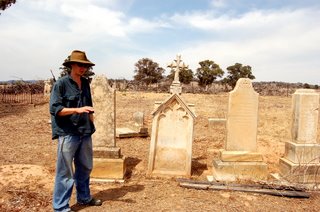
Diana, one of our 'adopting parents' and a medium, sent us the following email:
Hi Michael
When I was reading your newsletter, I got the 'idea' that you could expand or sell your concept to a cover more than just farmers and their stock - it could reach a wider audience - there is a niche group 'out there' for your (selling) concept. Without knowing you, your full concept (whether it is user friendly and can be adapted) I am relying on my mediumship to fill in the blanks.
Roughly I 'see' changes being made to your plan. Next I feel you will meet with an entrepreneurial type man from the X generation. Months pass before the plan becomes the final concept. Marketing will be easy. Finding the right person (male with NLP training) to travel miles demonstrating and selling your concept will be like finding a needle in the haystack but perseverance will pay off. I feel your original plan to save the sheep will then succeed for many years to come.
I feel you should take time out of your busy days to read over this email over and over until you 'see' the 'message'.
I wish you good luck if you take on this extra work (I am rarely wrong when I get 'ideas' concerning businesses) and remember to document the journey to fruition.
I should add that my adopting a sheep caused many of my friends and fellow exercisers to laugh - with words like 'trust you to find a way to help a animal at Christmas time'. Then they slowly realised that it was far better to do one little thing to help a farmer than just sit and watch the affects of the draught - feeling totally overwhelmed.
God bless
Diana
My reply outlines our plans to date:
Thank you Diana.
We have a business concept which we are 'conceiving'. It started with the desire to get a fair price for our wool, commensurate to the quality of the product we grow and the effort we put in. We intend to process and manufacture products for sale to consumers. The adoption scheme gave us the start of the process of identifying likely customers. (Unintentionally.) We will sell fleeces to spinners and craftswomen. We will spin the wool into yarn and sell it to knitters. And we will offer customers the opportunity to select and pattern or submit their won, and we will make up a garment, using a local knitter. I was blocked trying to think of how we could locate customers, but Adopt a Sheep opened the door. Our "Parents" might respond to the opportunity to purchase the fleece from their sheep, or the yarn, or a garment. On top of that we are exploring the opportunity of selling products with 'their sheep's' image on, such as t-shirts, coffee mugs, cushions, mouse pads, key rings, etc. These ideas are based on the belief that some (not all) of our "Parents" would like to deepen their relationship with their sheep and with Uamby. We also expect to have members of our new family come to stay and help with the sheep. Other products we could produce include postcards, childrens' books, photograph books, a book on The New Australian Farmer, a book on the ethics of agriculture (my field of study), a DVD on adapting to climate change. Further, we are deeply engaged in the climate change issue and will have 'soil carbon credits' for purchase soon, based on carbon sequestered in our soils and those of conservationist farmers from across Australia. We want to roll the whole concept out - already I have one young lady selling photos of their farm on Ebay to raise money for feed. I have helped her with publicity and website construction. Louisa and I are starting a series of seminars across the State to teach other farmers how to do it. We see this as part of our Mission to bridge the city-country gap. We then see opportunities for us as the retail shopfront provider for farmers who want to engage their 'new families' in the way we have outlined above - ie. we provide them with the infrastructure and management. We could also provide a farm stay booking service for farmers. All of this is driven by one thought: save the family farm, as an economic unit and as a sustainable environmental unit. Give farmers access to new revenue streams and incentives to conserve the environment by bringing city people and their needs and expectations into the equation. (Ie. an adoption scheme requires that the farmer be 'green' and ethical in their treatment of animals; growing soil carbon requires 'green' land management techniques.
We will read your message several times until we 'see' the opportunity. I welcome it. "ONWARDS!" is our motto.
Thank you for your guidance.
Michael















